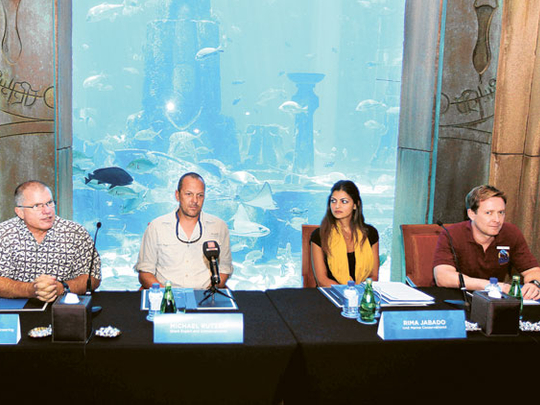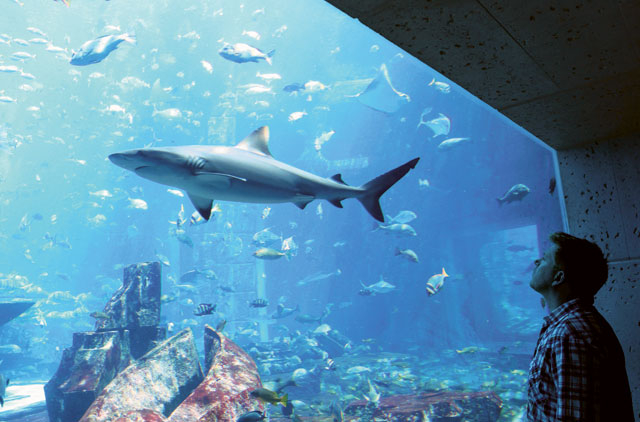
Dubai: The Far East appetite for shark-fin soup is decimating shark stocks around the world by more than 90 per cent, experts at Atlantis, The Palm said yesterday.
The damage at the top end of the marine food chain has occurred within five to 10 years and, given the size and breadth of the multi-billion dollar shark-fin industry, shows no sign of slowing.
Accurately gauging the impact of the shark-fin phenomenon in UAE waters at the moment is extremely difficult, experts said, given the lack of historic monitoring of more than 30 identified species in Gulf waters by qualified marine biologists.
But steps are now being taken to determine the health and extent of the UAE shark population in order to provide a data set upon which to build a proper management strategy, Rima Jabado, a marine conservationist, said.
Jabado has been researching shark numbers in UAE waters for two years and said it is too early in the project to definitively declare that over fishing is leading to dwindling stocks offshore.
Researchers "can't say whether there is a decline or not," she said, noting that "we need to know where the sharks are going."
Jabado said study is so lacking in the Gulf of sharks that new scientific monitoring has led to the discovery "of some species new to science in Gulf waters."
To help Jabado carry out her critical research, Atlantis, The Palm, announced yesterday that it is donating two satellite tracking tags to be affixed to sharks to glean details on their behaviour in UAE waters.
Steve Kaiser, vice president, Marine Sciences and Engineering at Atlantis, said, "We want to help Rima with her work; she is a leader in the UAE. Her work is absolutely critical."
Tracking details
Kaiser said the electronic tags will disseminate key information to the shark research project team such as water depth, temperature and global positioning of the sharks within a 100-kilometre radius.
The announcement was also attended by shark expert and conservationist Michael Rutzen, a globally celebrated figure for his television documentaries on major networks such as National Geographic, Discovery Channel and BBC.
He lauded Atlantis and Jabado's conservation efforts and said that warnings about global decimation of shark populations for their fins cannot be overstated.
Some shark "species are down to one or two per cent" of their original numbers and said efforts such as those in the UAE are "critical for their survival."
Demise of the predator
There can be no doubt about the demise of the ocean's top predator, he said. "The main culprit of their demise is shark fin soup," Rutzen said. "The problem of shark fins is on a global scale."
Jabado didn't have estimates for the total tonnage of sharks taken in Gulf regional waters but said the UAE declares to the UN that 400 to 500 tonnes of dried shark products are shipped to Hong Kong every year from within the country.
Pressed by reporters in the Lost Chamber exhibit at Atlantis yesterday, Jabado cited United Nations figures that suggest the UAE is the sixth largest exporter of shark fins in the world.
The UAE, statistics show, is "being used as a hub in the region," Jabado confirmed. "Traders will bring their sharks to the UAE and export them to Hong Kong."
A large number of shark fins are being routed through the UAE from Oman and Iran.
No verifiable numbers
Verifiable shark-taking numbers are not yet available for UAE shores. Reports in recent years show that sales of larger sharks being shipped to fish markets have been reduced considerably.
Ten years ago, all kinds of the predator species that are several metres long were common catches but today, it can be rare to see the large monsters that once roamed Gulf reefs in search of their next meal.
More common at Dubai fish market, for example, are smaller younger sharks taken by commercial anglers, including shark pups.
The apparent decline comes amid recent efforts by the UAE Ministry of Environment and Water to ban certain kinds of fish nets to help boost fish stocks.
The ministry also oversees a winter shark fishing ban from January to May to allow nursing pregnant females more opportunity to increase shark species in the wild.













